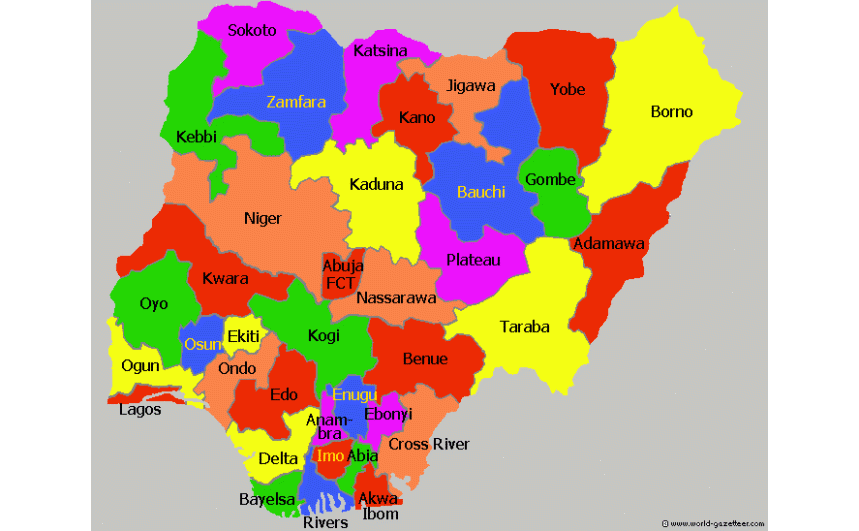By Chesa Chesa
A civic organization fostering accountability in Nigeria, Paradigm Leadership Support Initiative (PLSI), has released its Subnational Audit Efficacy Index for 2022, with Akwa Ibom coming tops and Kano State trailing others States in Nigeria at 36th position on the chart.
The 2022 Audit Efficacy Index is the third consecutive annual assessment that examined the level of transparency and accountability operational in the management of public funds and implementation of public policies in all 36 states of Nigeria, through public audit and key actors in the public audit action cycle.
The SAE Index 2022 report presented in Abuja on Wednesday placed Akwa Ibom State topmost having scored 69% while Yobe and Katsina States ranked 2nd and 3rd with 63% and 50%, respectively.
Abia, Benue, Borno and Kano States occupied 33rd, 34th, 35th, and 36th positions, respectively, having recorded 12%, 10%, 5% and 3% in that order.
Speaking on the methodology used for the assessment, the Executive Director at PLSI, Mr. Olusegun Elemo affirmed that the 2022 Index applied eight scoring parameters to arrive at the conclusions.
These include: Audit Legal Framework & Operationalization, Submission of Annual Activity Report, Type of Audit Document Published Online, Implementation of House Resolutions on Audit Recommendations, Evidence of Performance Audit, Availability of Citizens’ Accountability Report, Civil Society/Media Participation in the Audit Process and Effectiveness of Public Accounts Committee.
Mr. Elemo disclosed further that “our research team collected, examined, and validated data provided by Offices of Accountant-General, Supreme Audit Institutions, Public Accounts Committees, and Civil Society Organizations in all 36 States”.
He noted that “the States Fiscal Transparency, Accountability and Sustainability (SFTAS) Program for
Result initiative implemented between 2018 and 2022 achieved much in incentivizing transparency
reforms and enacting legal frameworks as the foundation for accountability.
“However, implementation of these legal frameworks has been the hard task for state executives and PLSI having envisaged a potential push-back or stagnation of these reforms especially as monetary incentives cease initiated the Subnational Audit Efficacy Index – an annual scorecard that assesses both the management of public funds and implementation of public policies at the state level.
“This annual assessment provides routine diagnostic feedback to PLSI and other development institutions on areas accountability actors at the subnational level are struggling and require support.”
Elemo further acknowledged that “PLSI is proud to have leveraged evidence from previous assessment to provide two-year assistance to five states through the ‘strengthening public audit practices and accountability at the state level in Nigeria’ project supported by the MacArthur Foundation”.
The SAE Index 2022 report showed that only two out of 36 States have made progress toward implementing financial autonomy for the Audit Office, according to a press statement issued by PLSI on the heels of the report presentation.
Also, 21 States did not publish full audit report for 2021 and only 11 out of 36 States published Citizens’ Accountability Report for 2021 online.
Furthermore, none of the 36 States produced standard performance audit repot on government’s programs, projects, or policies in 2021 and only 5 out of 36 States have effective Public Accounts Committee in their Houses of Assembly.
Similarly, only two out of 36 States are sufficiently involving civic and media actors in the audit process of their States.
Some recommendations offered by PLSI touched on the need for State Governors to exhibit strong “political will” to enhance effective implementation of Audit Laws, as well as capacity strengthening for auditors.
There were also recommendations for timeous review of audit reports by State Houses of Assembly and publishing full audit reports, in addition to citizens’ accountability reports online to enhance civic participation in the audit process.
******
States, charcoal dealers frustrating FG’s afforestation policies — Environment Minister
By Chesa Chesa
Minister of Environment, Mohammed Abdullahi, says that powerful interests, including State governments and charcoal dealers are frustrating some of Federal Government’s climate change policies by their deforestation activities like massive tree felling/logging for commercial charcoal production.
These activities directly affect Federal Government target to plant 25 million trees by 2030 under its afforestation policy, Abdullahi said during the 69th Session of the Ministerial Media Briefing organised by the Presidential Communications Team at the Aso Rock Villa, Abuja on Thursday.
He explained that efforts to check the trend and save the environment had been resisted by States which argued that the trees were not under the legal jurisdiction of the Federal Government.
He said, “The activities of the people in the charcoal business, with all due respect, are being supported by a number of powerful people at the sub-national level.
“And if we try to do some level of enforcement, they will tell you, ‘we own this territory,’ you are federal government and you cannot enforce your rule and policy on us.
“The challenge we are facing under deforestation and charcoal is engaging Nigerian Governors Forum because of the Land Use Act.”
The Minister explained that although the Federal Government would not wield control over state government lands, it was however, discussing with States to “work out a modality” such as the one being implemented by the Kaduna State government.
Making reference to Kaduna State, the Minister said, “it has invested some hectares of land to plant and we are working with the local governments. So, we are projecting other States will follow suit”.
He further said that the Federal Government had deployed a regulatory instrument to track forest areas with the most pressure.
“After tracking it, we raise red flags and then engage those communities and the state governments so that a solution can be brought to arrest of the continuous challenge to our forest.
“So, that is part of the challenge in terms of controlling these activities. But in spite of this, the task force is still there, going after some of them on ad-hoc basis, trying to find out who and who is involved, who licensed who. We are doing our best to curb the situation”, Abdulahi said.



